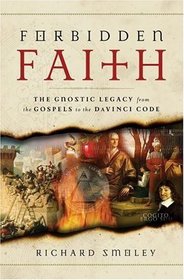Search -
Forbidden Faith : The Gnostic Legacy from the Gospels to The Da Vinci Code
Forbidden Faith The Gnostic Legacy from the Gospels to The Da Vinci Code
Author:
Who were the Gnostics? Were they heretics or visionaries who possessed the keys to Christianity's deepest secrets? Where did they come from? Did they leave any descendants? Why were they suppressed? Why do their ideas keep reappearing? — Forbidden Faith is a comprehensive popular history of Gnosticism, a secretive tradition that has survived ... more »
Author:
Who were the Gnostics? Were they heretics or visionaries who possessed the keys to Christianity's deepest secrets? Where did they come from? Did they leave any descendants? Why were they suppressed? Why do their ideas keep reappearing? — Forbidden Faith is a comprehensive popular history of Gnosticism, a secretive tradition that has survived ... more »
ISBN-13: 9780060783396
ISBN-10: 0060783397
Publication Date: 4/1/2006
Pages: 256
Rating: 1
ISBN-10: 0060783397
Publication Date: 4/1/2006
Pages: 256
Rating: 1
3 stars, based on 1 rating
Genres:
- Religion & Spirituality >> Other Religions, Practices & Sacred Texts >> Mysticism
- Christian Books & Bibles >> Church History >> Gnosticism




